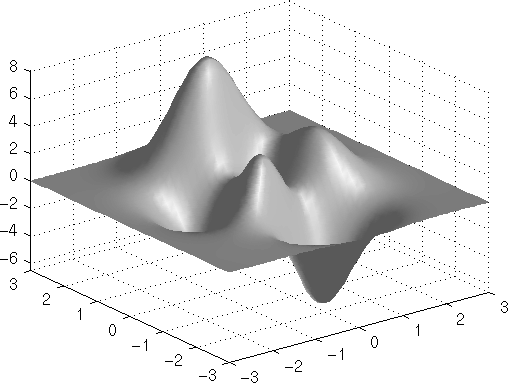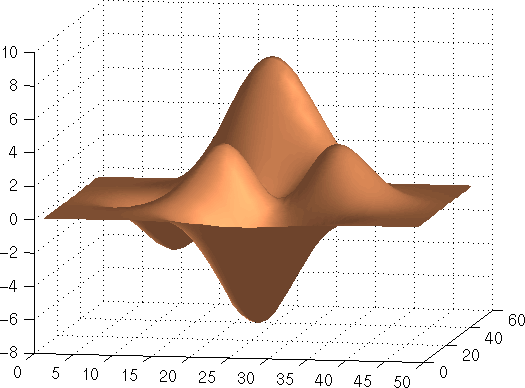Surface plot with colormap-based lighting
Syntax
surfl(Z)
surfl(X,Y,Z)
surfl(...,s)
surfl(X,Y,Z,s,k)
h = surfl(...)
Description
The surfl function displays a shaded Surface based on a combination of ambient, diffuse, and specular lighting models.
surfl(Z) and surfl(X,Y,Z)
create three-dimensional shaded Surfaces using the default direction for the light source and the default lighting coefficients for the shading model. X, Y, and Z are vectors or matrices that define the x, y, and z components of a Surface.
surfl(...,'light')
produces a colored, lighted surface using the Light object. This produces different results than the default lighting method, surfl(...,'cdata'), which changes the color data for the surface to be the reflectance of the surface.
surfl(...,s)
specifies the direction of the light source. s is a two- or three-element vector that specifies the direction from a Surface to a light source. s = [sx sy sz] or s = [azimuth elevation]. The default s is 45° counterclockwise from the current view direction.
surfl(X,Y,Z,s,k)
specifies the reflectance constant. k is a four-element vector defining the relative contributions of ambient light, diffuse reflection, specular reflection, and the specular shine coefficient. k = [ka kd ks shine] and defaults to [.55,.6,.4,10].
h = surfl(...)
returns a handle to a Surface graphics object.
Remarks
For smoother color transitions, use colormaps that have linear intensity variations (e.g., gray, copper, bone, pink).
The ordering of points in the X, Y, and Z matrices define the inside and outside of parametric surfaces. If you want the opposite side of the surface to reflect the light source, use surfl(X',Y',Z'). Due to the way surface normal vectors are computed, surfl requires matrices that are at least 3-by-3.
Examples
View peaks using colormap-based lighting:
[x,y] = meshgrid(-3:1/8:3);
z = peaks(x,y);
surfl(x,y,z);
shading interp
colormap(gray);
axis([-3 3 -3 3 -8 8])

To plot a lighted surface from a view direction other than the default:
view([10 10])
grid on
hold on
surfl(peaks)
shading interp
colormap copper
hold off

See Also
colormap, shading, light
[ Previous | Help Desk | Next ]
